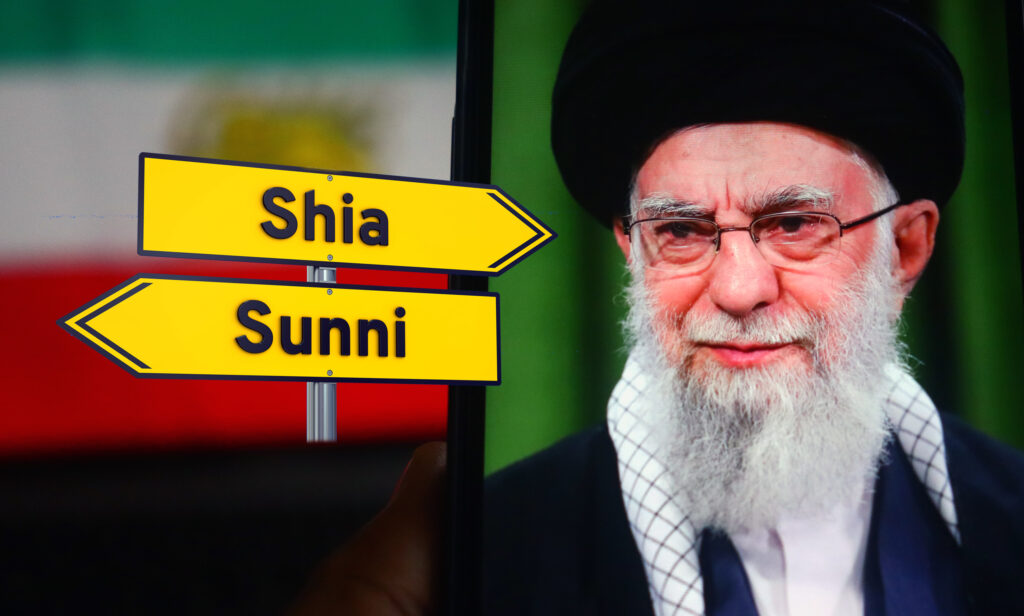Guest post by Joel Gilbert
To understand Iran’s obsession with destroying Israel, one must look to the centuries-old sectarian rift within Islam between Shia and Sunni Muslims. Most Iranians are Shia Muslims, while worldwide about 90% of all Muslims are Sunni. Within this divide is the real basis for Iran’s relentless opposition to the Jewish state because, at its core, Iran’s obsession with Israel is about a Shia Muslim inferiority complex within Islam.
For centuries of Islamic history, Shia Muslims were persecuted minorities, politically sidelined and religiously denounced by Sunni rulers. This long-standing experience of marginalization fostered a deep sense of embattlement among Shias, and they developed what can be described as a religious and psychological inferiority complex.
Today, there is a widespread attitude amongst Sunni Muslims that Shia Islamic practices deviate from the proper belief and practice of Islam to such a degree that Shia Islam constitutes heresy, even blasphemy. Simply put, most Sunnis do not consider Shias to be “real Muslims.” This attitude is reinforced by the fact that Iranian Shia are Farsi speakers, while the Qu’ran is written in Arabic, separating the Iranians from the language with a divine status in Islam.
Though both Shia and Sunni Muslims share the core tenets of Islam – belief in one God, reverence for the Prophet Muhammad, and adherence to the Qur’an, their differences began with an historical disagreement over who should lead the Muslim community after the Prophet Muhammad’s death in 632 CE.
The schism between Sunnis and Shias over the question of rightful succession led to two opposing factions. Sunnis (from Ahl al-Sunnah, or “people of the tradition”) supported Abu Bakr, a close companion of Muhammad, who was chosen by consensus. Shias (from Shi’at Ali, or “party of Ali”) believed leadership should stay within the Prophet’s bloodline, specifically passing to his cousin and son-in-law, Ali ibn Abi Talib.
Ali eventually became the fourth caliph, but his leadership was plagued by civil war with the Sunnis. His son Hussein’s martyrdom at the Battle of Karbala in 680 CE, at the hands of the Sunni-led Umayyad Caliphate, became a foundational trauma in Shia consciousness, and an enduring symbol of resistance against tyranny and injustice.
Over time, the two sects developed not only divergent leadership theories but also distinct theological and legal frameworks. While Sunnis rely on consensus (ijma) and the guidance of religious scholars (ulama), Shias believe in the Imamate, the divinely ordained leadership of the Prophet’s descendants through Ali, who are considered spiritually infallible.
The rise of Wahhabism, a puritanical Sunni movement that emerged in 18th-century Arabia, intensified the sectarian rift with Shias in modern times. With state backing from Saudi Arabia, Wahhabism branded Shia Islam as heretical, further marginalizing Shia communities.
When Iran’s Islamic Revolution established a Shia theocracy in 1979, it was not primarily about a rejection of Western influence. Rather, it was more of a Shia insurrection against Sunni dominance and an attempt to gain acceptance from Sunnis within the worldwide Muslim ummah (community).
The movement of Islamism began in the early 1900s as an indigenous, grassroots movement championed by both poor and educated Muslims throughout the Islamic world. The goal of Islamism is to return to governance to religious authorities, restoring the formula for Islam’s centuries of success that they believe has been corrupted by Western influences.
For the Islamist movement, the very existence of an independent Jewish state called Israel is a theological and historic impossibility. In Islam’s natural social order for 1,200 years, Jews lived as protected tributaries (dhimmi) in an inferior status under the leadership of Islamic society, due to their refusal to accept Islam. For Islamists, inferior Jews cannot be rulers in a sovereign state, so Israel is unacceptable in any size or circumstance.
Iran’s unrelenting hostility toward Israel is best understood as a deeply rooted expression of the centuries old Shia religious identity crisis within Islam. By adopting the mantle of the most uncompromising Islamist opponent of the Jewish state, Iran is asserting Islamic authenticity for Shia Islam throughout the Islamic world. This allows the Iranian Shia regime to appeal emotionally to the global majority Sunni Muslims, and demand religious credibility and respect from Sunni powers. By positioning Shia identity as one of heroic resistance to Jewish statehood Iran’s anti-Zionism is nothing less than a cry for legitimacy.
I chronicled Iran’s pursuit of nuclear weapons in my 2011 film, Atomic Jihad.
In essence, Iran’s obsession with Israel is less about Israel itself and more about Iran’s quest for Shia dignity and acceptance within the Islamic world. The root of the Iran-Israel conflict is not really about Israel’s policies or existence, but rather a centuries-old Sunni-Shia struggle in which anti-Zionism has become Iran’s chosen means of asserting legitimacy.
Ultimately, the key to resolving the Iran-Israel conflict may not lie in concessions or actions by Israel towards Palestinian Arabs. Instead, it may depend on a broader reconciliation within the Muslim world – one in which Sunni Islam comes to accept Shia Muslims, including Iranian Shias, as full and authentic members of the Islamic faith and ummah.
Joel Gilbert is a Los Angeles-based film producer and president of Highway 61 Entertainment. He is the producer of the new film Roseanne Barr Is America. He is also the producer of the films: Atomic Jihad and Farewell Israel: Bush, Iran and the Revolt of Islam. Gilbert is on Twitter: @JoelSGilbert.
Read the full article here
